- Home
- Jason McIntyre
Dread (Dovetail Cove, 1978) (Dovetail Cove Series) Page 4
Dread (Dovetail Cove, 1978) (Dovetail Cove Series) Read online
Page 4
Mac had been having dreams the last few months. He’d probably been having them a lot longer, though, and just not letting me in on it. I remembered last year, when we’d decided to stay away from the Cove for another Christmas, I’d found him hugging himself under a blanket on the deck in the middle of the night, getting blasted by sleet while the boat rocked. He said he’d be in soon. But he didn’t come for at least an hour.
He only started telling me about them and what he saw in them in the summer. And I’m not even sure why he’d bothered opening up at all. I suppose I knew more about Macedonian McLeod than anyone else on this earth, but still I knew almost nothing. He was a beer-and-peanuts kind of guy. He smoked Viceroys and he liked titty mags, but only the tasteful ones, no man parts in ‘em. He never looked at the hardcore stuff. What else. Hard to think of more. Meat and potatoes over vegetables. Steak and lobster kept him lean and muscled—surf ‘n’ turf, they called it farther down the coast, California-way. He liked a good clam chowder if it had the right stock. And fruit was for fruits.
Mac might have been a line cook in another life.
He looked over at the clock and I followed his eyes. It was quarter to five. I had no idea how long we’d been sitting here. “Well, I’ll make breakfast,” Mac said. “Another hot shower and shave.” We’d both had that royal treatment yesterday before the viewing and the service but two days in a row was rare.
Making breakfast. That was Mac’s segue to dropping this topic. I supposed we wouldn’t talk about the influx of virtual strangers who had arrived for the wake. At least not now.
Mac started to get up. I said, “What unit was Da in during the war?”
Mac frowned and sat back down, giving the big old mattress a squeak. “Why?”
“Just answer, man, I can’t remember.”
“Four-thirteen. You seriously don’t remember that either?”
“No, I did. Just wanted to make sure.”
He made to stand up again, then eyed me sideways to see if I had more. I did. “What was his tattoo? The one on his chest he said he got in the war before his discharge.”
“Uh, that big eagle. You’re being a bit of a jackass, right now, Dave, you know that, right?”
“Oh, I remember. I’m just testing you.”
“Elephant,” he said, tapping his temple with a smile that removed all memory of his crying from before. “Remember? No need to test my steel trap. But it sounds like you need some upkeep.” He punched me in the shoulder.
“Ow, cut it out, ya piece of shit.” I punched him back but I could tell it barely registered. “Seriously. I remember. It was a big eagle in black ink, basically grey after years of sun fading.” Da always had his shirt off on a day warm enough for it—tilling the back garden, fixing engines and smoking meat out back.
“Yuh,” Mac said, as if to mean, So? He didn’t glare at me like he had through the smoke of his Viceroy over at Ol’ Doc Sawbones yesterday afternoon in the kitchen. He gave me more leeway than anyone else but the question still hung in his tone.
“So, what else do you remember about that tattoo? The eagle spread across his pecs.”
Mac humoured me. He talked with his hands, as though Da stood before us at the side of the bed with his shirt off, and Mac gestured to the size of the tattoo in the air. “Well, the wings spanned across to just shy of his shoulders and then the talons came down in the middle, just above his belly, holding a big round, uh, globe—”
“And wha’d he have inked on the globe, do you remember—?”
“A’ course I remember,” he said, defensively. “His unit number. 413.”
Right, a big number 413, in faded red. Mac was right.
Then it dawned on Mac. “Holy mother of—Dave. That had been the tattoo on the naked guy.”
“Bingo,” I said.
Mac got up moved around the small bedroom, his big arms flexing as he paced and came to grips with this idea. He wore only boxer shorts and his forearms showed tan skin up to the biceps. His neck wore the dark of the sun too, still not faded this late in October. But the rest of him shone stark white. “Do you think that guy was someone from Da’s unit? In the war?”
“I don’t know,” I said. “But Doc told us Mr. Moort had a tattoo, didn’t he?”
“Yuh,” Mac said, not sure where I wanted to go with this.
“And I know he wasn’t in Da’s regiment. I don’t remember everything you do, but I remember this. Frankie Moort flew in the Air Force. Not the Navy with Da.”
2.
I remembered because Ma had mentioned it in her letter to me some five years back when Chief Birkhead asked her about Da’s boss at Union. Seems the Chief and his Deputy stopped by to question Ma in those days. There had been the thing with Da at the end of his life. Then there had been the whole other thing with the Zionist Church quite a few years later. Then there had been the investigation around Frank Moort after they found him in his bed rotting through his sheets.
Ma wrote me a lot of letters back then, as if I was her Dear Diary. Mac and I sent money home, of course. We had to when Teeny wrote us about how bad it had gotten. I didn’t know the details, just that they needed it. But we sent them cash through Western Union and we sent it to Teeny, not Ma. I’ve wondered since I heard the news of Ma’s death early last week if this all could have been avoided if we’d sent it directly to Ma instead. The money troubles must have weighed heavy on her the last while.
Ma had been upset that the cops, as she wrote, “harassed” her over Da’s ties to Frankie Moort. They’d apparently asked her if her husband, Oren, knew Frank before Da’s employment with Union. And Ma, according to her letter, had replied that they most certainly did not. Oren prided himself a Navy man and Frank Moort wore Air Force stripes. Apparently the rivalry between those two factions extended to their wives.
Since Mac and me had never served—something for which Ma said she praised the Lord on a daily basis—I could never understand the pride that went with service during wartime, nor the punches in the shoulders that Navy men gave Air Force guys and vice versa.
But the point is, I remembered Da’s tattoo. And I knew he didn’t have one on his back. Certainly not a blue tattoo of a B-24 with propeller blades spinning, a bare-breasted girlie on the side and the phrase, “Liberty for all!” in orange letters.
But Frank Moort might have.
After a breakfast of fried bacon, eggs and potatoes, expertly prepared by my brother, I went into the living room and picked up the phone. I had to hunt in the drawer for the Dovetail Cove phone directory so I could find Sawbones’ exchange number. I pushed aside Ma’s familiar yellow steno-sized notepad with curling corners and frayed top. Two pages had been torn out. Remnants of two pieces still held on to the metal coils at the top.
I pawed through a stack of bills and beneath them a wad of unopened letters held with a rubber band. The bottom one looked the same as all the rest, though, opened tidily, I can only presume by Ma using her ivory-handled letter opener. It wasn’t there in the drawer, not that I could see.
I opened the bottom envelope and read the single page inside. It was a past due notice for a mortgage on 34 Lannen Lane, Dovetail Cove.
But I knew the mortgage on our house had been paid the year Da had died. I remember because, as a boy, I had cried to Ma with worry about how we would make it. Some boys at school had told me the bank might take our house since the end of Da’s paycheque. To calm me down, Ma explained it to me so I could understand it, and her explanation came out as truthful considering I was just a kid. As part of Da’s life insurance package with Union, the house had been paid off and there had been a chunk of money given to Ma too.
But here I was, staring down at an overdue mortgage notice for Ma’s house, the same one we’d grown up in. There was no earthly reason for Ma to have taken out a mortgage.
I didn’t recognize the bank’s name either. It wasn’t Island Credit Union or First Savings and Loan, the two lenders on the island. It was a bank I’d ne
ver heard of, Western Federated in Seattle, Washington. And it was dated June 9, 1977. More notices from Western Federated made up the stack of identical, unopened envelopes, all postmarked through the summer.
I began to piece together why Ma had taken those pills. Why Mrs. Walsh had finally used her key to come into the house and found her in bed in a cloud of flies and stink.
Crippled old women, at home by themselves, with only the TV and the newspaper, sure, things happen. They bump their heads or take a fall. But Ma had done it to herself. Mrs. Walsh found the bottle, and read the note, written on a sheet torn from the yellow notepad right here in this desk. Was Mac guilty that we’d not been home in years to see her? Maybe. I wasn’t. I loved my Ma. At least, I did when I was a kid, living here.
But more than that, I felt sorry for her. Da had done some horrible things but his passing had left her set for life. And with that, she’d ignored her own welfare and instead paid for much of the new Zionist Church with her donations even though our little sister couldn’t afford tuition. And now I found out that the house had been re-mortgaged, presumably because of money troubles.
I was fuming mad. Mad at Ma. Mad at myself. Served me right that I didn’t know about this. But how could I have? Mac and me, we’d stopped paying attention after we left. And neither of us had been home in more than three years.
Without dialling Doc’s exchange, I got up and left the house.
3.
I lay in the tall grass and weeds in the back yard between the old garage, its door askew, and the back stairs that led up to the kitchen door. I stubbed out the end of my smoke on the bottom of my shoe then leaned back again to watch two gulls trace circles in the sky. They cried out their questions and then came an answer from a lone cricket left over from the night. He was somewhere in the clover behind me, singing, either lamenting the end of the rain or signalling more to come.
The sun was warm, but the air was still crisp. Classic island weather for late October, despite talk of hot days and nights in the earlier part of the month. The smells and sheer weight of the air was like time travel. So was the neighbourhood. It was only a little after eight now and the rain from yesterday had soaked the lawn. The back yard hadn’t been weeded in years. And it hadn’t been mowed this summer at least. The garden was overgrown and untended and one of the apple trees had a broken branch weathered enough to look like it had split at least a couple years back.
Chewing a long shoot of crabgrass and staring up at the plain blue sky, the cold and wet trailed down my back, ass and legs but I didn’t care. I had gone for a walk and a smoke to clear my thinking and the icy press of the ground on me now was a keen wakeup call. I felt like I had been sleepwalking since news had arrived of Ma’s death. It was good to have the wake behind us.
It was a nice luxury to get out and walk. Little pisses you off when you’re at sea with a bunch of mostly like-minded fishermen, but when you do need space, there isn’t any. The decks offer fresh, sea air and a place to smoke your brand, but you’re not apt to find distance from the intrusion of other souls. Lannen Lane on a sunny fall Tuesday was quite the opposite.
Ma had been scared of living a life without money. Despite her dependence on the wheelchair these last years, I knew it was the thought of being dependent that she feared more. She wouldn’t have used the word dependent. Nope. She’d have called it helpless.
I could understand why she’d taken out the new mortgage. I just didn’t like that she had, especially without talking to Mac or me. I knew Da wouldn’t either, not if he’d still been alive.
A wind chime hanging from the back eave tinkled and drew my attention to the back landing and door of the house. From there, I followed an imaginary path with my eyes down the steps and across the thick grass. Yesterday, the naked man with the two war tattoos had gone that way and I looked off to the northwest corner of the yard to where he had disappeared from sight. I’d seen no hint of his trail this morning on my walk through the lanes and streets of the east part of town. Though, what did I expect to find as evidence of a naked, badly scarred man with that crazy mishmash of hair? Did I expect he’d pee a trail and mark off the corners of Ma’s yard like a wild animal?
Mac was right. One tattoo was similar—if not exactly the same—as Da’s. A Navy tat with his regimental number. As I understood it, those regiments had distinct artwork in their tattoos. No regiments had exactly the same one. You got one the same as your unit and other units got their own. It was an identifier, a proud marker of your sacrifice, honour and brotherhood. I suppose someone in another unit could get the same tattoo, maybe if they visited the same parlour. Maybe two units would both decide on an eagle holding a globe—but they wouldn’t have the same unit number.
I chewed the stem of grass and stared up at the sky where it was now a trio of gulls circling in silence. I thought of the slim chances of finding two identical tattoos of an eagle holding a globe with 413 on it, especially out here on such a small island. Not just slim, I thought. Downright rare. Especially since I remember Ma and Da talking about it when we were kids. No survivors from Da’s regiment lived out this way.
Although if Chief Birkhead had been right and some traveller had taken a ferry over for the summer, that might explain it. He could have—what did they call it?—shell shock? Some kind of stress disorder from serving and he was out of his right mind. That would explain the frantic altercation in the kitchen. Maybe he was even at Ma’s house looking for our Da if they’d served together. Maybe he was looking to connect with Da and didn’t know Da had taken a bullet over here during peacetime.
But it didn’t explain the two tattoos. Da’s eagle and regiment number on his chest plus another big piece of ink I was pretty sure indicated an air force regiment on his back. Although, his skin had been a patchwork. He could have been badly burned, either in the war or sometime after. Maybe he’d gotten a skin graft from an air force donor with that naked lady on the airplane tattoo, some sad sap who hadn’t been as lucky as only being badly burned.
I can’t remember where I’d heard it—it might have even been Da who used to say it—but I had a phrase roll through my head like a lick of thunder.
The simplest answer is usually the right one.
According to Doc, the simplest answer here was that it was Frank Moort eating the canned goods in Ma’s pantry, Frank Moort risen from the dead despite six years in the ground. Why did that outlandish option seem the easiest for a man like Doc Sawbones, I wondered. He delivered all three of us from our Ma, was there the day her spine had been nicked by a blade and my Da took his last breath. He would be bound by the laws of biology, wouldn’t he? If not bound by them, at least swayed. Science and medicine and rational explanations would certainly make the most sense to a man like Doc.
Although, maybe his age and losing his wife, maybe it all intersected for Ol Doc. It was certainly possible that even the most reasonable mind could slip a cog or two in old age, and after stress. Maybe he missed being revered in town. Maybe having two young men like Mac and me hanging on every word as he spun his yarn was a kind of relived glory.
I closed my eyes against the chilly air and the broad glare of the morning sun. I pictured the eagle across the man’s chest in Ma’s kitchen. Yes. It was the same as Da’s. I was sure it was at least similar to the one I remembered from boyhood.
And I saw the purple birthmark beside his grotesquely-sized member, completely slack but as long and thick as if it had been armed and ready for use at any of the brothels Dave and Me occasionally visited down the coast California-way. The birthmark may have been his own, or, I didn’t know, grafted from a skin donor.
Then I pictured the naked lady on the B-24 Bomber on the back shoulder blade when the intruder had turned to run out the kitchen door. That picture was new for me. I’d never seen it before. And, in my line of work, I’d seen a lot of tattoos on men of all ages.
The simplest answer, I thought.
I got up, the backs of my clothes soaked thro
ugh to my chilly skin, and headed up the stairs to the back door where our naked visitor had escaped through yesterday afternoon. I’d call the Doc. I’d have a shower and a shave then walk to town and meet with him again. Mac would be taking the truck to go meet with the lawyer. He was named Ma’s executor in her will and I had seen Da’s old Buick was missing from the garage when I’d peeked in. I didn’t bet on sports games—not even the World Series, but if I was a betting man, I’d put a thousand dollars down that she’d sold it to cover some expenses.
My mind went back to the birthmark and those two pieces of ink.
If the answer was so simple, why couldn’t I see it?
4.
I met with Doc, not at the Highliner or one of the other cafes in town, but on the front stoop of his former practice. Fishing for his key, the old doc looked around like a nervous conspiracy theorist and said, “Glad you called, David. You’re brother’s a good feller but just as stubborn as your ol’ man was.”
I smiled. “Mac’s gonna join us after he’s done at the lawyer’s.”
Doc stopped and looked at me sideways. “Oh,” he said, then shoved a key in the dirty door knob. “Good, good,” he said, a measure of back-pedalling. “Three heads are better. ‘Specially with something this...odd.”
He turned the key, then the knob and leaned on the old door. The smell of must hit my nose. The new town doctor was a much younger man and, instead of taking over Doc’s office when he assumed the practice, he’d renovated a suite on the second floor of the Union Rail building down a block or so. Since the plant had closed, rail use had slowed to grain handling from the north plus limited shipments from the mine. After Frank Moort died, Union had closed their Dovetail Cove office, telling the Island Press that a management presence wasn’t needed on the island and no longer made business sense.

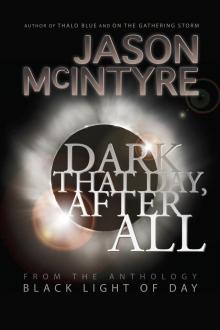 Dark That Day, After All
Dark That Day, After All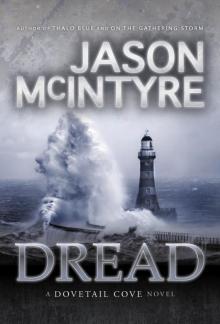 Dread
Dread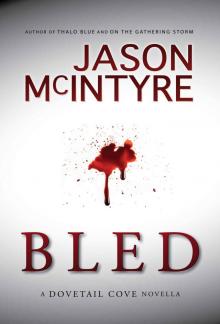 Bled
Bled Instead
Instead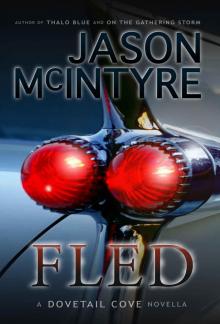 Fled
Fled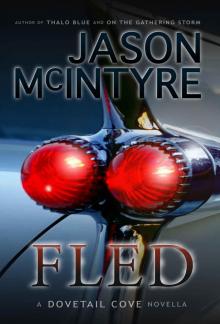 Fled (Dovetail Cove, 1973) (Dovetail Cove Series)
Fled (Dovetail Cove, 1973) (Dovetail Cove Series)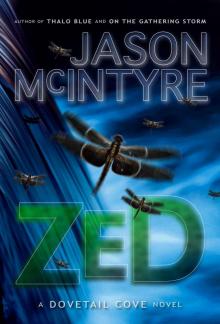 Zed
Zed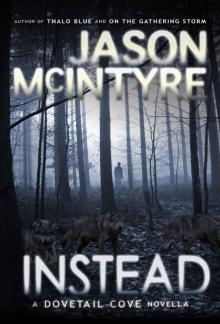 Instead (Dovetail Cove, 1979) (Dovetail Cove Series)
Instead (Dovetail Cove, 1979) (Dovetail Cove Series)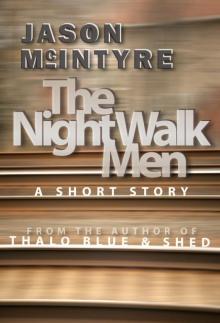 The Night Walk Men
The Night Walk Men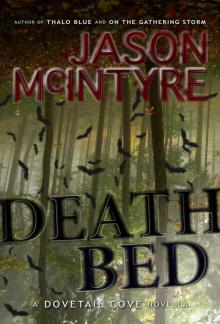 Deathbed (Dovetail Cove, 1971) (Dovetail Cove Series)
Deathbed (Dovetail Cove, 1971) (Dovetail Cove Series)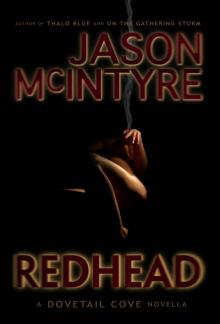 Redhead (Dovetail Cove, 1974) (Dovetail Cove Series)
Redhead (Dovetail Cove, 1974) (Dovetail Cove Series)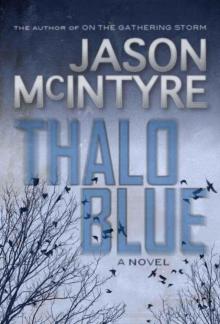 Thalo Blue
Thalo Blue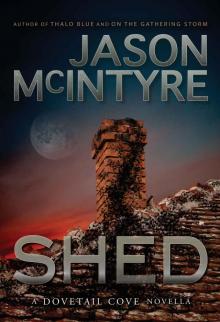 Shed
Shed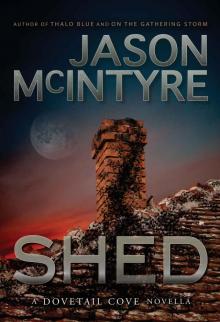 Shed (Dovetail Cove, 1977) (Dovetail Cove Series)
Shed (Dovetail Cove, 1977) (Dovetail Cove Series)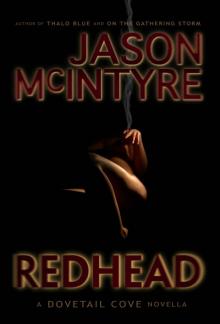 Redhead
Redhead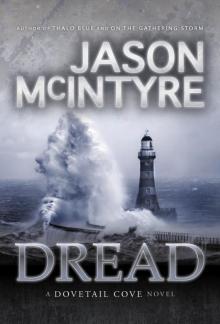 Dread (Dovetail Cove, 1978) (Dovetail Cove Series)
Dread (Dovetail Cove, 1978) (Dovetail Cove Series)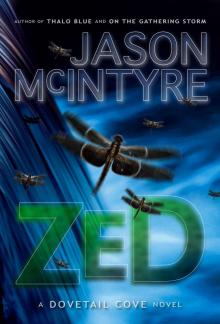 Zed (Dovetail Cove, 1975) (Dovetail Cove Series)
Zed (Dovetail Cove, 1975) (Dovetail Cove Series)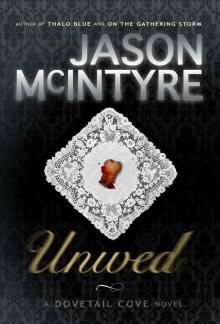 Unwed (Dovetail Cove, 1976) (Dovetail Cove Series)
Unwed (Dovetail Cove, 1976) (Dovetail Cove Series)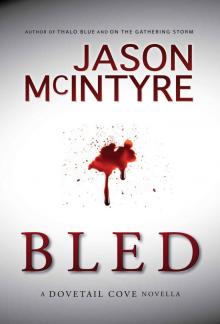 Bled (Dovetail Cove, 1972) (Dovetail Cove Series)
Bled (Dovetail Cove, 1972) (Dovetail Cove Series)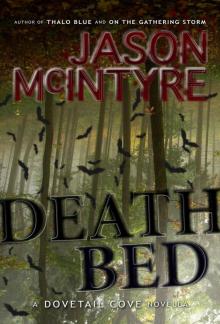 Deathbed
Deathbed